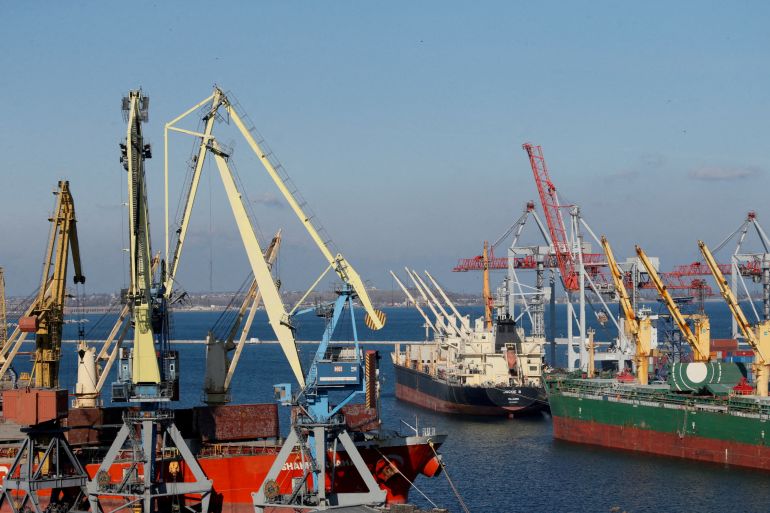Russia says opening Ukraine ports would need review of sanctions
Ukraine, one of the world’s biggest grain producers, used to export most of its goods through its seaports.

Moscow has said that sanctions on Russia would have to be reviewed if it were to heed a UN appeal to open access to Ukraine’s Black Sea ports so that grain could be exported, according to an Interfax news agency report.
Ukraine, one of the world’s biggest grain producers, used to export most of its goods through its seaports, but since Russia sent troops into Ukraine, it has been forced to export by train or via its small Danube River ports.
Keep reading
list of 3 itemsEnd of an era: McDonald’s strikes deal to sell Russia restaurants
US offers ‘complete backing’ for NATO bids by Sweden and Finland
UN food chief David Beasley appealed on Wednesday to Russian President Vladimir Putin, saying, “If you have any heart at all, please open these ports.”
Beasley’s World Food Programme feeds some 125 million people and buys 50 percent of its grain from Ukraine.
Interfax on Thursday quoted Russian Deputy Foreign Minister Andrei Rudenko as saying, “You have to not only appeal to the Russian Federation but also look deeply at the whole complex of reasons that caused the current food crisis and, in the first instance, these are the sanctions that have been imposed against Russia by the US and the EU that interfere with normal free trade, encompassing food products including wheat, fertilisers and others.”
Russia’s decision to send its troops into Ukraine almost three months ago has prevented Ukraine from using its main ports on the Black and Azov Seas, and cut its grain exports this month by more than half compared with a year ago.
Russia and Ukraine together account for nearly a third of global wheat supplies. Ukraine is also a major exporter of corn, barley, sunflower oil and rapeseed oil, while Russia and Belarus – which has backed Moscow in its intervention in Ukraine and is also under sanctions – account for more than 40 percent of global exports of the crop nutrient potash.